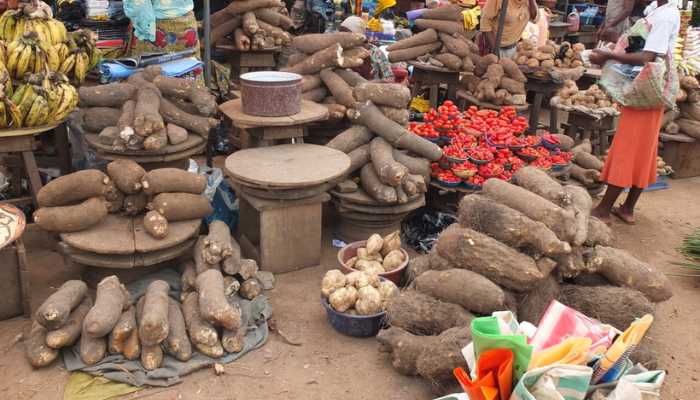Why food prices are dropping
In the space of nine months, food inflation has fallen by 9.2 percent, from 26.08 percent in January 2025 to 16.87 percent in September 2025, bringing stability in staple prices.
Food inflation, which tracks the average rise of food prices within a period, has risen at a much slower pace since the rebasing of the National Bureau of Statistics (NBS) report at the beginning of the year.
It experienced a disinflation in September when it contracted month-month by 1.57 percent, the first time in 13 years.
Nigerians are beginning to experience relief in prices of certain food staples as several factors are presently leading the charge in inflationary pressures, especially in food.
A market survey by BusinessDay shows that prices of some food items frequently consumed by Nigerians are falling as against their 2024 price range.
For instance, a 50kg bag of rice now costs N65,000, down from about N92,000 in October 2025. Similarly, prices of a big tuber of yam now sell for an average of N3,500 from a N10,000 high last year.
Also, a big basket of tomatoes currently sells for an average of N35,000 as against N50,000 in the same period last year, reflecting a 30 percent drop.
BusinessDay looks deeper at some of the factors driving food inflation drop in Nigeria’s agricultural sector.
Read also: Nigeria, FAO explore deeper collaboration to enhance food security, farmer support
Favourable climate
Many farmers and agribusiness experts have attributed a favourable climate to be the reason for deceleration in food inflation. For them, adequate rainfall, coupled with improved climate in 2025, is heavily contributing to better harvest and slumping food prices as there are more food available in markets.
“The rains this year did more good than harm to our crops,” said Hassan Suleiman, a Kogi-based cashew farmer.
Suleiman explained how adequate rainfall during the rainy season bolstered his harvest — his largest harvest in many years.
Farmers in other food value chains say consistent rainfall led to a boom in their harvest.
Although the rains this year destroyed a lot of farms in states like Niger, where hundreds of people were displaced and about 10,000 hectares of rice farms wiped out.
But for several farmers, it afforded them their biggest harvest and the result reflects in cheaper food items.
Declining insecurity attacks
Experts note that insecurity is no longer at its peak. Farmers have now returned to the farms, and this is leading to a surge in food production.
China Peters, a Benue-based farmer, told BusinessDay that more farmers in the food basket state have returned to farming after the state suffered a series of banditry attacks that displaced many people and took the lives of several others.
“Insecurity is not the way it used to be,” he said. “More farmers have been able to return to the farms.”
Peters, who was forced into an Internally Displaced People (IDP) camp due to heightened banditry incidents in his community, now farms a small portion within the camp.
Last year, over 1,356 farmers in northern Nigeria lost their lives to insecurity attacks fueled by farmer-herders clashes, according to SBM Intelligence, an Africa-focused market and security intelligence firm.
Ibrahim Kabiru, president of All Farmers Association, reaffirmed that, “insecurity is decreasing in many states”.
Read also: Nigeria’s hunger crisis deepen, ranked 115th in Global Hunger Index
Harvest season
Abiodun Olorundero, an agribusiness expert and managing partner at Prasinos Farms, told BusinessDay that food prices have begun easing as farmers harvest in food-producing states.
“Food inflation is dropping, and Nigerians are buying food at lower prices,” he said. “We are at the tail end of the harvest season, which has increased food circulation,” he said.
Increased food imports
The federal government created a free import window that spanned from July 15 to December 31, 2024. This window was to allow import of husked brown rice, grain sorghum, and beans, with duty rate levy ranging from 5 percent to 30 percent.
Today, that policy, though effected at a slower pace, is a major player in the relief experienced by Nigerians.
Toyosi Olatayo, founder/CEO of Palmira Farmtrade, an agro firm involved in cassava business, said “the free import policy led to a surplus in garri across markets as supply became more than demand,”.
Findings by this reporter shows that a paint of garri now costs an average of N1,500 as against N4,000 in the same period of 2024, highlighting 63 percent fall.
An expert who craved anonymity reiterated that a surge in food imports in the first six months of 2025 (Jan – June), is a reason why there is a relief in food inflation in Nigeria.
According to trade data from the NBS, Nigeria’s food import bill boomed to N2.22 trillion from January to June 2025, up 18 percent from N1.81 trillion in the same period of 2024.

